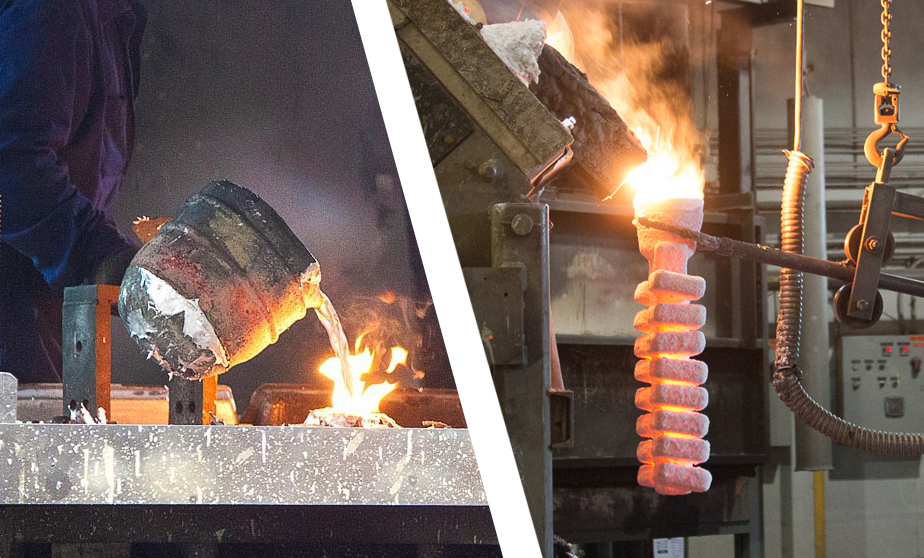Facts About Alcast Company Revealed
Facts About Alcast Company Revealed
Blog Article
More About Alcast Company
Table of ContentsAn Unbiased View of Alcast CompanyThe 30-Second Trick For Alcast CompanyGet This Report on Alcast CompanyThe Of Alcast CompanyThe Ultimate Guide To Alcast CompanyThe Ultimate Guide To Alcast Company
The refined distinction hinges on the chemical content. Chemical Comparison of Cast Aluminum Alloys Silicon promotes castability by lowering the alloy's melting temperature and boosting fluidity during spreading. It plays a crucial function in permitting elaborate molds to be filled accurately. In addition, silicon contributes to the alloy's toughness and wear resistance, making it valuable in applications where toughness is important, such as automotive parts and engine components.It additionally boosts the machinability of the alloy, making it simpler to process into finished items. This way, iron adds to the overall workability of aluminum alloys. Copper boosts electrical conductivity, making it advantageous in electric applications. It likewise enhances rust resistance and adds to the alloy's overall stamina.
Manganese contributes to the toughness of light weight aluminum alloys and boosts workability. Magnesium is a lightweight component that offers stamina and impact resistance to aluminum alloys.
Some Known Details About Alcast Company
Zinc boosts the castability of light weight aluminum alloys and helps manage the solidification procedure throughout casting. It boosts the alloy's stamina and solidity.

The main thermal conductivity, tensile stamina, return toughness, and prolongation vary. Among the above alloys, A356 has the highest possible thermal conductivity, and A380 and ADC12 have the most affordable.
The 9-Minute Rule for Alcast Company

In accuracy spreading, 6063 is fit for applications where complex geometries and high-grade surface finishes are vital. Examples include telecommunication units, where the alloy's superior formability allows for smooth and visually pleasing designs while keeping structural stability. Likewise, in the Lighting Solutions industry, precision-cast 6063 components create classy and effective illumination components that call for complex shapes and great thermal performance.
The A360 exhibits superior elongation, making it perfect for complex and thin-walled components. In precision spreading applications, A360 is appropriate for sectors such as Consumer Electronic Devices, Telecommunication, and Power Devices.
What Does Alcast Company Do?
Its special homes make A360 a beneficial choice for precision casting in these markets, improving product longevity and high quality. aluminum foundry. Light weight aluminum alloy 380, or A380, is an extensively used spreading alloy with a number of distinctive attributes.
In precision spreading, light weight aluminum 413 shines in the Consumer Electronics and Power Devices sectors. It's frequently used to craft elaborate components like smartphone housings, cam bodies, and power device coverings. Its accuracy is remarkable, with tight resistances approximately 0.01 mm, guaranteeing perfect product assembly. This alloy's exceptional rust resistance makes it a superb option for outside applications, making certain lasting, durable items in the pointed out markets.
Alcast Company Things To Know Before You Get This
The aluminum alloy you choose will significantly affect both the casting process and the properties of the last product. Because of this, you have to make your choice carefully and take an enlightened approach.
Determining the most ideal aluminum alloy for your application will certainly indicate evaluating a vast array of qualities. These relative alloy qualities follow the North American Die Spreading Association's standards, and we have actually divided them into 2 classifications. The first classification addresses alloy features that influence the production procedure. The second covers features affecting the homes of the end product.
Some Of Alcast Company
The alloy you select for die spreading straight affects several aspects of the spreading procedure, like just how easy the alloy is to deal with and if it is susceptible to casting defects. Warm cracking, also known as solidification fracturing, is a typical die spreading defect for aluminum alloys that can cause interior or surface-level rips or cracks.
Certain light weight aluminum alloys are more vulnerable to warm fracturing than others, and your option ought to consider this. One more usual problem found in the die casting of light weight aluminum is pass away soldering, which is when the cast adheres to the die walls and makes ejection tough. It can damage both the actors and the die, so you must seek alloys with high anti-soldering homes.
Corrosion resistance, which is discover here already a notable attribute of aluminum, can vary substantially from alloy to alloy and is an important particular to take into consideration depending upon the environmental conditions your product will be revealed to (Foundry). Put on resistance is one more building generally looked for in aluminum items and can differentiate some alloys
Report this page